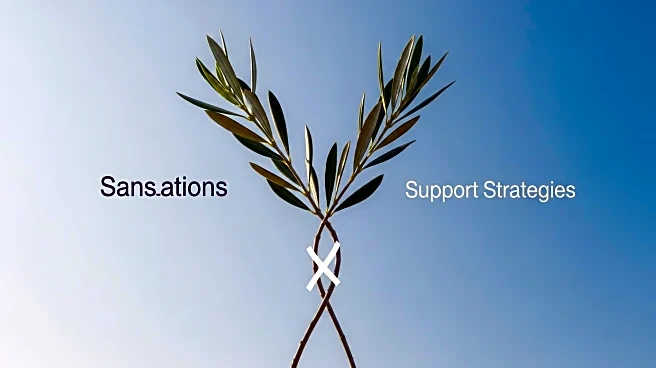What's Happening?
The European Union is exploring new strategies to support Ukraine in its ongoing conflict with Russia. During recent informal talks in Copenhagen, EU foreign and defense ministers discussed potential measures, including secondary sanctions targeting Russia's trading partners and the establishment of Ukrainian arms production facilities within the EU. The discussions also covered the possibility of seizing frozen Russian assets to aid Ukraine, although this proposal faces legal and investment-related concerns from some EU members. Additionally, the EU is considering moving its military training mission for Ukrainian troops onto Ukrainian soil, contingent on a ceasefire.
Why It's Important?
The EU's deliberations on new sanctions and support measures for Ukraine highlight the bloc's ongoing commitment to countering Russian aggression. The potential implementation of secondary sanctions could significantly impact Russia's economy by targeting its international trade partners. Establishing Ukrainian arms production within the EU would not only bolster Ukraine's defense capabilities but also send a strong message to Russia about the EU's support. The debate over frozen Russian assets underscores the legal and ethical complexities involved in international financial sanctions. These developments could influence EU-Russia relations and have broader geopolitical implications.
What's Next?
The EU will continue to refine its strategies for supporting Ukraine, with potential decisions on secondary sanctions and arms production facilities expected in the coming months. The debate over frozen Russian assets will likely persist, with EU members weighing the legal and economic ramifications. The proposal to relocate the EU's military training mission to Ukraine remains contingent on achieving a ceasefire, which currently appears unlikely. The EU's actions will be closely monitored by international stakeholders, including the United States, which has been a key ally in supporting Ukraine.
Beyond the Headlines
The EU's discussions reflect broader geopolitical tensions and the challenges of maintaining unity among member states with differing perspectives on Russia. The potential seizure of Russian assets raises questions about the balance between punitive measures and adherence to international legal norms. The establishment of Ukrainian arms production in the EU could lead to increased military collaboration and innovation within the bloc. These developments may also influence the EU's future foreign policy and defense strategies, particularly in relation to Russia and Eastern Europe.











